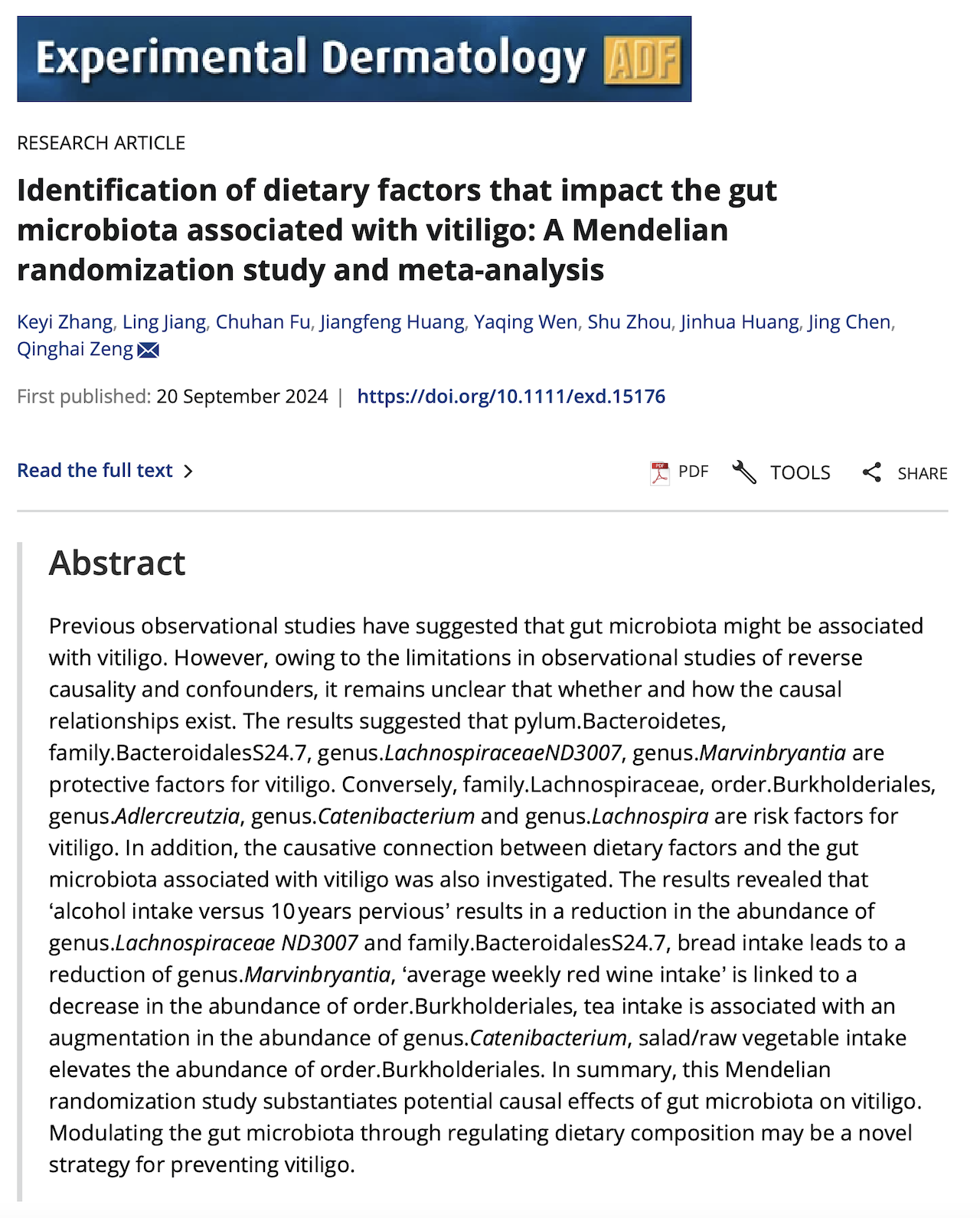New
Diet, Microbiome, and Vitiligo: Unveiling the Mystery
Scientists have long suspected a connection between gut bacteria and vitiligo, a condition causing skin pigmentation loss. While previous research hinted at a relationship, it wasn’t clear whether gut bacteria played a direct role.
Now, two new studies have shed light on the issue. By analyzing data from multiple studies, researchers first identified specific gut bacteria that may protect against or increase the risk of vitiligo. Another team has determined how the gut microbiota regulates skin oxidative stress in vitiligo and suggested potential treatment strategies for the disease.
Protective & Risk-Associated Bacteria
- Protective Bacteria: Common probiotics like Bifidobacteria and Lactobacilli were found to reduce the risk of vitiligo.
- Risk-Associated Bacteria: The genus Ruminococcaceae UCG004 was linked to a higher risk of vitiligo, with evidence suggesting a bidirectional relationship between this bacteria and the condition.
How Diet Shapes Gut Bacteria
The study highlighted how diet can impact gut bacteria relevant to vitiligo:
- Bread: May decrease bacteria protective against vitiligo.
- Red Wine: Could lower levels of potentially harmful bacteria.
- Hard Alcohol: Reduces beneficial bacteria in the gut.
- Tea: Might increase bacteria associated with vitiligo risk.
- Raw Vegetables and Salad: Can raise levels of bacteria linked to vitiligo.
Foods that Boost Beneficial Gut Bacteria
- Whole Grains. Consuming whole grains, especially those high in fiber, can boost beneficial bacteria like Bifidobacteria and Lactobacillus/Enterococcus. These foods contain complex carbohydrates that gut microbes ferment into short-chain fatty acids (SCFAs), which have various health benefits.
- Protein Sources. A collagen-rich diet may protect skin from aging and accelerate wound healing. Whey and pea proteins can reduce harmful bacteria while increasing beneficial microbes like Lactobacillus and Bifidobacterium.
- Probiotics. Probiotic strains such as Bacillus, Bifidobacterium, and Lactobacillus can prevent harmful bacteria colonization, reduce inflammation, and improve skin health by restoring its barrier and reducing sensitivity.
What This Means for Vitiligo
This study reinforces the role of gut bacteria in the development and progression of vitiligo. Adjusting your diet to encourage a healthy gut microbiome may help reduce inflammation, strengthen the immune system, and minimize vitiligo lesions.
Before making significant dietary changes, individuals with vitiligo should consult healthcare professionals to ensure personalized and effective approaches to managing the condition.
These findings are not the ultimate truth and should be considered alongside other research. However, they generally support conclusions from previous studies, such as:
Dig Deeper
- Gut Feelings: How Your Microbiome Talks to Your Brain (and Skin)
- Is there a special diet for vitiligo?
- Relationship Between Smoking and Vitiligo
- Nutrients for Vitiligo — Same Old Story or New Hope?
Updated on May 10, 2025

FAQOther Questions
- Are there any famous people with vitiligo?
Many celebrities have dealt with vitiligo while remaining in the public eye, maintaining a positive outlook, and having a successful career. Here are a few courageous famous peo...
- Which skin conditions can be mistaken for vitiligo?
Vitiligo is a common skin condition with characteristic milky white patches of irregular shape. However, several other skin conditions exhibit similar symptoms that can lead to ...
- Can Ayurveda help with vitiligo?
Ayurveda, the ancient Indian system of holistic medicine, focuses on balancing body energies (Doshas) and improving digestion. While it offers a valuable perspective on "whole-b...
Though it is not always easy to treat vitiligo, there is much to be gained by clearly understanding the diagnosis, the future implications, treatment options and their outcomes.
Many people deal with vitiligo while remaining in the public eye, maintaining a positive outlook, and having a successful career.
Copyright (C) Bodolóczki JúliaBy taking a little time to fill in the anonymous questionnaire, you can help researchers better understand and fight vitiligo.
